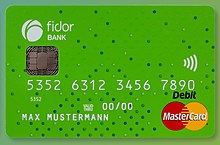
| Part of a series on financial services |
| Banking |
|---|
 |
A debit card, also known as a check card or bank card, is a payment card that can be used in place of cash to make purchases. The card usually consists of the bank's name, a card number, the cardholder's name, and an expiration date, on either the front or the back. Many new cards now have a chip on them, which allows people to use their card by touch (contactless), or by inserting the card and keying in a PIN as with swiping the magnetic stripe. Debit cards are similar to a credit card, but the money for the purchase must be in the cardholder's bank account at the time of the purchase and is immediately transferred directly from that account to the merchant's account to pay for the purchase.[1][2]
Some debit cards carry a stored value with which a payment is made (prepaid cards), but most relay a message to the cardholder's bank to withdraw funds from the cardholder's designated bank account. In some cases, the payment card number is assigned exclusively for use on the Internet, and there is no physical card. This is referred to as a virtual card.
In many countries, the use of debit cards has become so widespread that they have overtaken checks in volume or have entirely replaced them; in some instances, debit cards have also largely replaced cash transactions. The development of debit cards, unlike credit cards and charge cards, has generally been country-specific, resulting in a number of different systems around the world that are often incompatible. Since the mid-2000s, a number of initiatives have allowed debit cards issued in one country to be used in other countries and allowed their use for internet and phone purchases.
Debit cards usually also allow an instant withdrawal of cash, acting as an ATM card for this purpose. Merchants may also offer cashback facilities to customers so that they can withdraw cash along with their purchase. There are usually daily limits on the amount of cash that can be withdrawn. Most debit cards are plastic, but there are cards made of metal and, rarely, wood.[3]
- ^ Nancy Lloyd (September 3, 2000). "Adding Up the Drawbacks of a Credit Card That Isn't". Archived from the original on July 28, 2022. Retrieved July 28, 2022.
- ^ Cite error: The named reference
DeLuxLargerwas invoked but never defined (see the help page). - ^ "Top metal debit cards that are stunning and easy to get". May 10, 2021. Archived from the original on September 28, 2021. Retrieved September 28, 2021.